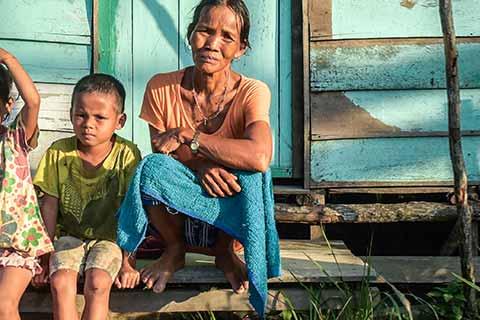Related content:
Updated SDG tracker helps navigate the jumble of land data and information
More than a dozen land-related indicators are housed over five SDG goals, with data maintained by different custodian agencies. The Land Portal re-launched the SDG Land Tracker to help land stakeholders monitor developments and discussion.
SDG Land Tracker
The SDG Land Tracker provides easy access to official data and information on all land-specific SDG indicators. It concisely explains the indicators, why they are important, and tracks progress.
Context
UN member States endorsed the 2030 Agenda for Sustainable Development and committed to implement the Sustainable Development Goals (SDGs) - a set of 17 Global Goals, in a 15-year period.
The SDGs contain land-related targets and indicators under SDGs 1, 2, 5, 11 and 15. Many national, regional and global organizations and stakeholders working in the land sector are committed to implementing the SDGs and monitoring the land-related indicators to promote responsible land governance and secure tenure rights for all. Land is a key economic resource inextricably linked to access to, use of and control over other economic and productive resources thus, critical to achieving the SDGs.
The official data and metadata are available at the SDG Indicators Database maintained by the UN Department of Economic and Social Affairs.
Learn more about the SDG Land Tracker.
Discover the five targets and 13 indicators related to land:
Updated SDG tracker helps navigate the jumble of land data and information
More than a dozen land-related indicators are housed over five SDG goals, with data maintained by different custodian agencies. The Land Portal re-launched the SDG Land Tracker to help land stakeholders monitor developments and discussion.
Updated SDG tracker helps navigate the jumble of land data and information
More than a dozen land-related indicators are housed over five SDG goals, with data maintained by different custodian agencies. The Land Portal re-launched the SDG Land Tracker to help land stakeholders monitor developments and discussion.
SDG Land Tracker
The SDG Land Tracker provides easy access to official data and information on all land-specific SDG indicators. It concisely explains the indicators, why they are important, and tracks progress.
Context
UN member States endorsed the 2030 Agenda for Sustainable Development and committed to implement the Sustainable Development Goals (SDGs) - a set of 17 Global Goals, in a 15-year period.
The SDGs contain land-related targets and indicators under SDGs 1, 2, 5, 11 and 15. Many national, regional and global organizations and stakeholders working in the land sector are committed to implementing the SDGs and monitoring the land-related indicators to promote responsible land governance and secure tenure rights for all. Land is a key economic resource inextricably linked to access to, use of and control over other economic and productive resources thus, critical to achieving the SDGs.
The official data and metadata are available at the SDG Indicators Database maintained by the UN Department of Economic and Social Affairs.
Learn more about the SDG Land Tracker.
Discover the five targets and 13 indicators related to land:
Updated SDG tracker helps navigate the jumble of land data and information
More than a dozen land-related indicators are housed over five SDG goals, with data maintained by different custodian agencies. The Land Portal re-launched the SDG Land Tracker to help land stakeholders monitor developments and discussion.
Updated SDG tracker helps navigate the jumble of land data and information
More than a dozen land-related indicators are housed over five SDG goals, with data maintained by different custodian agencies. The Land Portal re-launched the SDG Land Tracker to help land stakeholders monitor developments and discussion.
SDG Land Tracker
The SDG Land Tracker provides easy access to official data and information on all land-specific SDG indicators. It concisely explains the indicators, why they are important, and tracks progress.
Context
UN member States endorsed the 2030 Agenda for Sustainable Development and committed to implement the Sustainable Development Goals (SDGs) - a set of 17 Global Goals, in a 15-year period.
The SDGs contain land-related targets and indicators under SDGs 1, 2, 5, 11 and 15. Many national, regional and global organizations and stakeholders working in the land sector are committed to implementing the SDGs and monitoring the land-related indicators to promote responsible land governance and secure tenure rights for all. Land is a key economic resource inextricably linked to access to, use of and control over other economic and productive resources thus, critical to achieving the SDGs.
The official data and metadata are available at the SDG Indicators Database maintained by the UN Department of Economic and Social Affairs.
Learn more about the SDG Land Tracker.
Discover the five targets and 13 indicators related to land:
Updated SDG tracker helps navigate the jumble of land data and information
More than a dozen land-related indicators are housed over five SDG goals, with data maintained by different custodian agencies. The Land Portal re-launched the SDG Land Tracker to help land stakeholders monitor developments and discussion.
Copyright © Source (mentionné ci-dessus). Tous droits réservés. Le Land Portal distribue des contenus sans la permission du propriétaire du copyright sur la base de la doctrine "usage loyal" du droit d'auteur, ce qui signifie que nous affichons des articles de presse pour des fins d'information non commerciales. Si vous êtes le propriétaire de l'article ou d'un rapport et que vous souhaitez qu'il soit retiré, s'il vous plaît nous contacter à hello@landportal.info et nous le supprimerons immédiatement.
Divers articles de presse liés à la gouvernance foncière sont publiés sur le Land Portal chaque jour par ses utilisateurs, à partir de diverses sources, telles que les agences de presse et d'autres institutions et individus, ce qui représente une diversité de positions sur tous les sujets. Le droit est à la source de l'article; la Land Portal Foundation n'a pas le droit de modifier ou de corriger l'article, ni d'endosser son contenu. Pour apporter des corrections ou demander la permission de republier ou toute autre utilisation de ce contenu, merci de contacter le titulaire du droit d'auteur.


